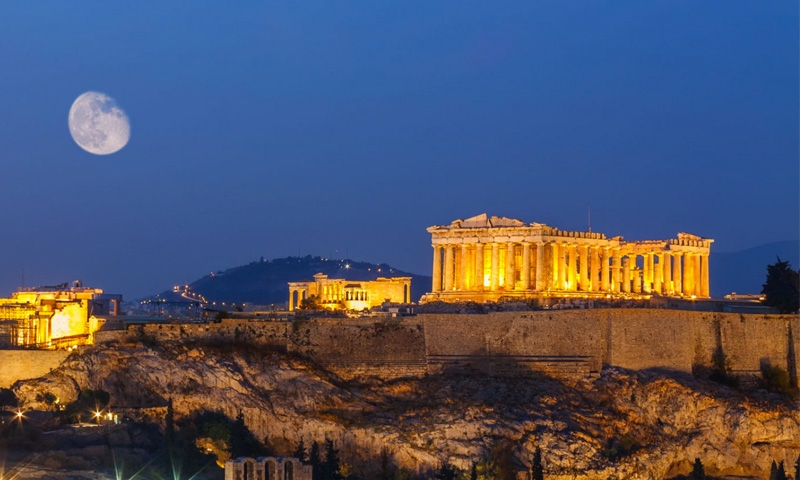Democracy will still surprise us
Gazing at the Acropolis the other day from an Athens rooftop, I was reminded of Samuel Beckett’s words: “Ever tried. Ever failed. No Matter. Try again. Fail again. Fail better.”
Athenian democracy, a male preserve, far from universal, failed in due course. Still, to see that white citadel in the Athenian dawn is to be reminded of the millennia of human striving for a political system permitting citizens to exercise power through the ballot box: government of the people, by the people, for the people, as Lincoln put it.
Try again. Fail again. Fail better.
It’s important to put our current democratic travails in perspective. At its best, democracy is a culture that empowers free citizens to participate in shaping their fates. At its worst, it is a charade in which civic bonds erode, power accrues to the few, self-aggrandizement becomes the norm, and tolerance and restraint are consumed by the howling mob. Then the very word becomes a sham, a disguise deployed by autocrats like Vladimir Putin.
The Parthenon exhorts us to be stubborn about the sacredness of truth.
At the Athens Democracy Forum, hosted by The New York Times, I listened to the Greek foreign minister, Nikos Kotzias, allude to “undemocratic liberalism” as a catalyst to the current wave of “illiberal democracy” in places like Poland and Hungary. The voter is wise. Voters have been telling us something about failure these past several years. To ignore those failures — involving impunity, arrogance, inequality and remoteness — is to invite ruin.
People think differently. Representative democracy provides a means to mediate these differences for the greater good. It depends on the recognition, not the trampling, of disparate views.
Democracy in danger has become a buzzword. Let’s not forget that Greece and South Africa, resilient through crises, and Malaysia and Indonesia, suggest otherwise. The human urge to be free is not about to die in the 21st century.
But, yes, Western democracy is in upheaval. Of late, it has concentrated, but not spread, wealth, suggesting that it’s no more than a vehicle for injustice.
Technology, twin-souled like Goethe’s Faust, has changed the world for good and ill. We like. We dislike. We follow. We unfollow. We broadcast our lives. We fall silent. Adrenaline surges. Status anxiety follows. Contemporary life is a restless experiment in global direct democracy. We are networked. Facebook has more than 2.2 billion monthly active users. So do we really need representative democracy? Is it not just a means for rich globalized insiders to control our lives?
Tired formulas will not help resolve this question. At the conference, Karolina Wigura, a Polish sociologist, demanded a new “optimism of the will.” She urged liberals to be more entertaining, more patriotic — to contemplate without preconceived ideas what works in a modern economy. Liberals, she suggested, have become bores.
Yascha Mounk, a lecturer on government at Harvard University, said the anti-democratic fires raging should not be underestimated. Each civic act, he suggested, is a glass of water that may help extinguish the flames.
Which brings me to President Donald Trump, the flamethrower who makes headlines even by falling silent. A joke is doing the rounds. When Putin and Trump met in Helsinki, they shook hands. “I’m Vladimir Putin, president of Russia,” Putin said. “I’m Donald J. Trump, president of the United States,” Trump said.
“Oh,” said Putin, “what does the J stand for?”
“Jenius!” said Trump.
This is the Age of the Genius.
The Genius has little time for democratic checks and balances. The New York Times is “fake news.” The Genius mocks the architecture of postwar stability underwritten by American power. “America First!” he declaims. He believes in “the will of the people,” dangerous phrase, as Angie Hobbs, a British philosopher, noted.
If Trump is a fascist, Marx was right: History repeats itself, first as tragedy, then as farce. I wonder.
Certainly, it’s easy to lose your bearings in his torrent of lies. It’s easy to shrug. The most ugly chapters of history are littered with bystanders.
So, what am I worried about? Truth, above all, please protect it; arrogance, as in the overuse of the word populism, a word freighted with contempt. I worry about atomization, the reduction of human beings to extensions of their devices. I worry about the insidiousness of Trump’s moral depravity. I worry about the value of America’s word, the glue to alliances that have upheld the free world.
Still, I am an optimist. Democracy is stubborn. It raises our gaze. It is the system that best enshrines the unshakable human desire to be free. Athens reminds us of that. America reminds us of that. It fails. It falls short of John Winthrop’s “city upon a hill.” It strives still to fail better.
Perhaps you know the story of the old man on his deathbed approached by his children.
“Dad,” they say. “We were afraid to ask you but perhaps the time has come. Do you want to be buried or cremated?”
“Oh, I don’t know,” he says. “Surprise me!”
Democracy will still surprise us.
(Roger Cohen is a columnist with The New York Times.)
(In collaboration with New York Times)
Related Posts

